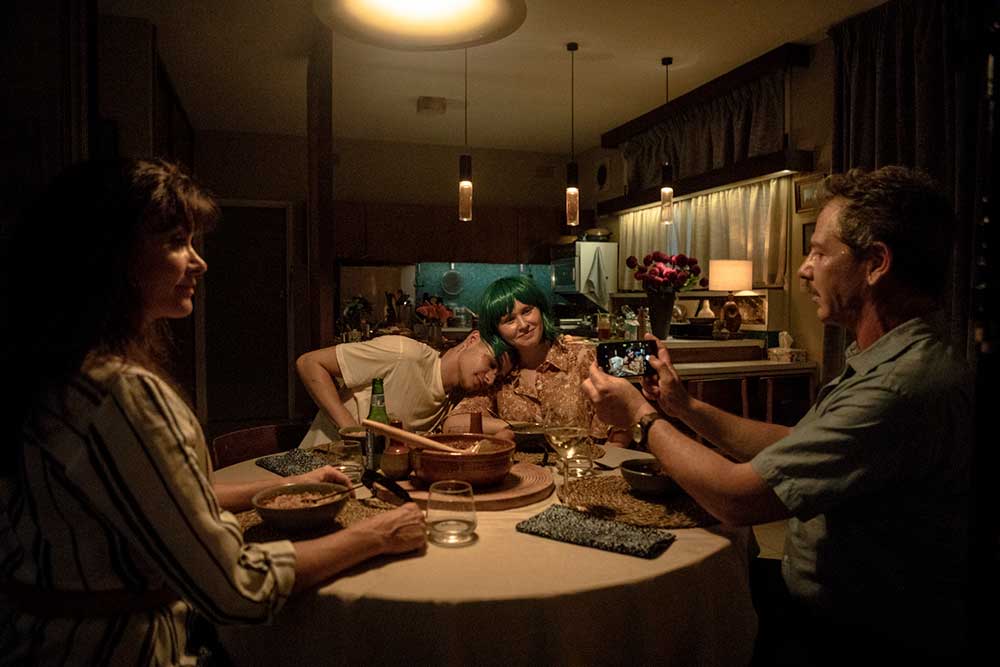Babyteeth is a quirky, surprising, and ultimately very moving film about teenage terminal illness that is less a wistful tearjerker than it is a coming-of-age drama. Read our interview with director Shannon Murphy.

Milla (Eliza Scanlen), the 16-year-old protagonist of Babyteeth, might have terminal cancer, but she’s also an ordinary teenage girl. A mess of raging hormones and restless energy, she grapples with the question of what kind of person she will mature into as an adult, even if her condition means she may not live to become one. Director Shannon Murphy and screenwriter Rita Kalnejais (both making their feature film debuts) have crafted a quirky, surprising, and ultimately very moving film about teenage terminal illness that is less a wistful tearjerker than it is a coming-of-age drama.
We don’t learn of Milla’s condition until a few scenes into the film, and even then, not through anything that is actually said or witnessed, but rather an on-screen chapter heading that reads, bluntly: “Relapse. Milla starts chemo.” Used throughout the film, these chapter headings provide exposition so that the details of her suffering can remain off-screen.
What we witness on-screen consists of Milla’s day-to-day life, which resembles that of a typical teenager with familiar concerns and problems. There’s tension with her parents — her mum, Anna, and dad, Henry, played by two of Australia’s finest actors, Essie Davis and Ben Mendelsohn — as she develops an intense crush on a boy, Moses (played by Toby Wallace), whom she meets on the way home from school.

Homeless, addicted to drugs, and, most troubling of all, seven years older than Milla, Moses seems like every parent’s nightmare, especially those as suburban and middle class as Milla’s. Their worst fears about him are confirmed when they catch him red-handed stealing their collection of prescription drugs, having broken into their home in the middle of the night. Yet there’s something fundamentally innocent and good-natured about him. His amateurish attempt at burglary, in which he cluelessly rummages through the family’s drug supply, ignorant of what it is he’s actually stealing, is, in Anna’s own words, “remarkably inept.” It’s not the act of a callous criminal, but rather that of a child-like, vulnerable young man desperately addicted to drugs.
Similarly, Moses’ relationship with Milla isn’t predatory in the way we would expect given how much older he is. He does not appear to be interested in her sexually, but sees her more as a non-romantic companion. In fact, he probably would not have continued to see her were it not for the fact that, upon realising how happy he makes Milla, her parents offer to supply his drug habit. Even in these circumstances, he is sincere with Milla: he playfully goofs around with her and caters to her wishes, such as agreeing to be her date for the high school prom.
Babyteeth subverts our expectations about how these parents would respond to a character like Moses, prompting us to reconsider our definition of good parenting. Naturally, Anna and Henry are initially dismayed by their daughter’s burgeoning relationship. But they understand that she may not have long to experience life’s joys and excitement. In an effort to pick her up from the low ebb in which we find her at the start of the film, they begin to begrudgingly accept Moses into the family unit. “This is the worst possible parenting I can imagine,” Anna wryly comments in a moment of reflection late in the film, and yet it makes disarming sense in the context of a character like Milla who longs to fulfil and enjoy her rites of passage as a teenager before it’s too late.

From the striking string cover version of The Stranglers’ “Golden Brown” that opens the film, music plays an important role in telling Milla’s coming-of-age story. These songs often prompt Milla’s expressions of youthful zest, such as one scene in a club at the film’s mid-point when she ecstatically dances to the Tune-Yards’ “Bizness.” At home, by contrast, she expresses her more melancholic emotions by playing slower, sadder music on her violin, and bonds with her pianist mother by playing together. Amidst her adolescent angst, Milla must reconcile her desire to try new, more adult hedonistic experiences, like clubbing and experimenting with alcohol and drugs, with her need to process her troubled emotions. At the same time, she must remain attentive to her fragile health, and maintain her strained bond with her mother. Music provides a way through which Milla can process all of these things.
With lyrics that allude to taking heroin, “Golden Brown” is a particularly apt opener for a film about a group of people who are all dependent on drugs. Milla relies on medication to treat her cancer, while Moses is an addict. Anna, too, takes a wide variety of prescription drugs for her mental health, while even the outwardly controlled Henry is later revealed to have his own secret illegal drug habit. Milla might be the one suffering from a terminal illness, but all of these characters are damaged and in need of repair.
Refreshingly, Murphy doesn’t condemn the characters for their drug dependencies, but instead, contextualizes this, at least for her family, as a means of dealing with the grief and trauma triggered by Milla’s diagnosis. At one key point late in the film, Milla chastises her father for his coping mechanisms, telling him — “You think you can fix things by handing out drugs.” He and her mother are unwavering in their faith that drugs — whether it’s Milla’s medication, or the drugs they take for their own sake — are a feasible solution to a myriad of problems.
Only Milla understands that there are some things that cannot be fixed, even with the help of drugs, and accepts the possibility that she may never recover. She understands the painful truth that her time on earth may end prematurely, and so rather than fixating on her condition and how to overcome it, Milla craves instead to get the most out of life while she can. Moses helps her with this and, in exchange, she inspires him to kick his drug habit, when he, after opening up about his upsettingly distant relationship with his own parents, asks her for help. Despite her young age, Milla emerges as the wisest character in the film.
The film honours her lust for life by focusing on her coming-of-age story rather than her illness. Her relationship with Moses becomes something different and more mature as the film develops, and she recognises an opportunity to do good by both him and her parents, forming a nuclear family to endure even in her absence. The ending is certainly not where you’d predict this film was headed from the opening, but it’s a very satisfying end to Milla’s arc of growing up and moving on.

